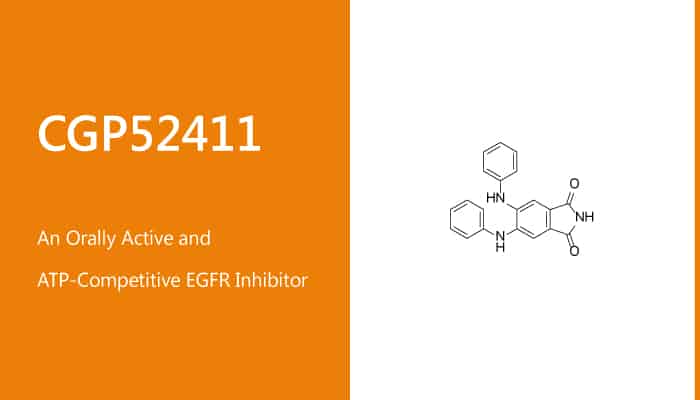The epidermal growth factor receptor (EGFR) is a transmembrane glycoprotein that mediates the response of cells to EGF and transforming growth factor α. Deregulated signal transduction via the EGFR family of protein-tyrosine kinase growth factor receptors is relevant to proliferative diseases. Besides, the EGFR is involved in epithelial proliferation and has been, strongly implicated in malignant tumor growth. Moreover, the enzymatic activity of the intracellular kinase domain of the EGFR is essential for signal transduction via the EGFR. Furthermore, the involvement of the EGFR and p185c-rB2 protein tyrosine kinases in epithelial proliferation. Thus, it suggests that selective enzyme inhibitors could have therapeutic potential in the treatment of malignant and nonmalignant epithelial diseases. In addition, the closely related c-erbB2 gene is amplified or overexpressed at high frequency in human breast and ovarian carcinomas. CGP52411 (DAPH) is a selective, potent, orally active and ATP-competitive EGFR inhibitor with good anticancer activity.

CGP52411 (DAPH) is a selective, potent, orally active and ATP-competitive EGFR inhibitor with an IC50 of 0.3 μM. Specifically, CGP52411 blocks the toxic influx of Ca2+ ions into neuronal cells. Nonetheless, CGP52411 dramatic inhibits and reverses the formation of β-amyloid (Aβ42) fibril aggregates associated with Alzheimer’s disease. In cells, CGP52411 selectively inhibited both ligand-induced EGF-R and p185c-erbB2 autophosphorylation and c-fos mRNA induction. Meanwhile, CGP52411 may offer therapeutic agents for the treatment of hyperproliferative diseases that overexpress EGF-R family protein-tyrosine kinases or their ligands. All in all, CGP52411 is a selective, potent, orally active and ATP-competitive EGFR inhibitor with good anticancer activity.
References:
Buchdunger E, et al. Proc Natl Acad Sci U S A. 1994 Mar 15;91(6):2334-8.